Here are a few things worth your time:
Why is music journalism collapsing? by
Quote: “The irony is that exciting new music is still getting released—but almost nobody hears it. The system actively works to hide it.”
This is about Pitchfork being folded into GQ magazine and there’s some outrage over it. Which is funny, because a lot of music lovers *hated* Pitchfork in the late 00s…
Like Barnes & Noble used to be loathed (You’ve Got Mail!) but is now revered for keeping bookstores alive or something…
Ted’s piece is very good at the reasons for music criticism fading away, but let’s be honest, music criticism has long since changed, it was probably overdue
I say that as someone who had an MP3 blog and used to write the occasional punk rock reviews
A lot of bands depended too much on critics and good reviews, and really didn’t hustle to do the work
The environment is slightly different now, with Spotify / Apple Music flattening out what you’re listening to, and you don’t have to seek it out or spend your own money, so I get that angle…
But music criticism should probably never have been as big as Rolling Stone, and Pitchfork was/is part of Conde Nast, which has bigger demands than a little blog
Maybe Ryan Shreiber(?) the founder of Pitchfork will raise some money and get it back…
What we talk about when we talk about giving up. At The Guardian.
Quote: “What exactly do we imagine we are doing when we give something up? There is an essential and far-reaching ambiguity to this simple idea. We give things up when we believe we can change; we give up when we believe we can’t.”
What would a hunter gatherer do? At
Quote: The heuristic is to ask: “What would a hunter-gatherer do?” (WWAHGD?)
From my point of view—as an admittedly biased observer—it is amazing how much of what is peddled as healthy for the individual and society would naturally result from imitating a hunter-gatherer life:
What does switching from paper to screens mean for how we read? At Psyche.
Quote: “One of these findings is the screen inferiority effect. As its name suggests, this effect refers to demonstrations that – with all else being equal – a text that is read on a digital screen will be less well understood than the same text if it is read on paper.”
My take: You don’t capture as much info when you read from screens, but I usually read non-fiction on screens and prefer fiction in paper. Maybe that’s backwards…
How To Discover Your Own Taste.
An Interview with Kyle Chayka at The Ezra Klein Show (Link to transcript)
Speaking of Pitchfork, Kyle’s book is called Filterworld and it’s essentially about how algorithms have flattened everything. Not just music, but interior design and preferences. I just bought it for Kindle (screen!)
Quote:
”I would land in a particular city, whether that was Tokyo or L.A. or Berlin or Beijing, and I always managed to find a particular style of coffee shop. It was this minimalist box of a cafe with white subway tiles on the walls and midcentury Scandinavian furniture and handmade ceramic mugs with nice cappuccinos in them. And this was not the work of a parent company. It wasn’t a Starbucks. It wasn’t a global chain. Instead, it was all of these completely independent coffee shops, baristas, entrepreneurs, who had decided to mold themselves into the same aesthetic.”
By me at Medium:
Books
Still reading the same ones as last week!
Enjoying LaserWriterII by Tamara Shopsin quite a bit, it’s about a nice quirky computer repair shop in the 90s. It’s more slice of life than anything resembling a plot
Before you criticize a man, walk a mile in his shoes. That way, when you do criticize him, you'll be a mile away and have his shoes. — Steve Martin
Keep going-
Josh Spilker
PS: Check out my note-taking templates on Gumroad. Talk soon!




